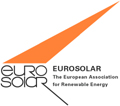 EUROSOLAR Press Release, December 4th, 2003
EUROSOLAR Press Release, December 4th, 2003Statement of Dr. Hermann Scheer, president of EUROSOLAR, on the European Commission draft ‘Proposal for a Directive of the European Parliament and of the Council concerning measures to safeguard security of electricity supply and infrastructure investment’.
The draft directive proposal on the security of energy supply ignores the true causes of the growing insecurity of European electricity supply. A true security of electricity supply can only be obtained with a complete shift to renewable energies.
The European Commission is presently engaged in a an opaque process of preparing a proposed directive on the security of energy supply, in line with its prior endeavours to create an overcentralised European energy policy. Due to ongoing disagreement between DG TREN and other DGs, no final agreement has been reached so far, but the proposal should be expected to be presented before the European Council meeting on December 12 and 13.
The draft proposal is an enormous step backwards for European energy policy. The Commission abuses consumer’s and industry’s fears after the recent black-outs in Italy, Denmark/Sweden and the UK and clouds their real causes. In a complete perversion of the concept of ‘security of electricity supply’, the proposal would cement power generation from exhaustible fossil and nuclear resources. However, citizens both want and expect renewable energies to make up the main share of a secure future energy supply (see the September/October 2003 opinion poll about the security of energy supply conducted by the German Allensbach Institute at http://www.bmu.de/files/ meinungen_energiepolitik_031100.pdf - in German).
Not only does the Commission’s proposal completely ignore the inexhaustible potential of renewable energy sources. Its provisions will be harmful to the development of renewable energy sources in Europe, despite continuing rhetorical lip-service to the cause of renewable energies. The draft prepares for a new priority for investment in centralised old-fashioned conventional power plants (300 additional GW in 750 large new power plants!) to be built according to the Commission in a quasiemergency scenario, possibly in the hope of avoiding debate and transparency.
In recital (9) the draft demands ‘an appropriate regulatory framework for investment, which creates regulatory certainty (!) and incorporates a reasonable rate of return on (...) investments’ for transmission system operators. This rhetoric could be used to constrain and prevent the spreading of the most successful legal instrument for the promotion of renewable energies: the feed-in model, where the grid owner is obliged to buy renewably generated electricity at a fixed rate.
The true causes of the insecurity of European electricity supply are - the limited availability of the fossil and uranium resources it is based on, - its devastating effect on the atmosphere and the human environment, - its antiquated infrastructure of centralised large power plants, - the ignorance of the tremendous indigenous potential of renewable energies.
The limited availability of fossil and nuclear resources causes erratic economic and political dependencies from unstable regions, which will grow as resources become scarcer. The environmental impact goes so far that the fossil-nuclear energy system has been digging its own grave by heating up the global climate: Part of the reason for the Italian blackout was the scarcity of cooling water caused by the exceptionally hot summer. Also in Germany and France, many nuclear power plants had to reduce their effect, because their massive water needs could not be met. The centralised generation of power, which is the unquestioned credo of the present internal market for electricity concept is a key factor behind the blackouts. The ‘Interim report of the Investigation Committee on the 28 September 2003 Blackout in Italy’ concludes that the long distance transmission of electricity from Switzerland contributed to the grid instability.
EUROSOLAR and others have repeatedly demonstrated how these problems can be overcome by a complete transition to decentralised renewable energy sources (see the studies and documents on our website). Therefore, EUROSOLAR calls upon Members of the European Parliament and on Member States to reject the Commission’s proposal. Instead, the EU should take the following measures to promote the transition into a solar economy based on decentralised electricity generation from renewable energy sources:
- Guaranteed feed-in tariffs for Renewable Energies, based on the successful example in Germany and Spain
- A complete tax exemption for all biofuels for 20 years, which would immediately open the door for a broad market introduction
- Research into renewable energy and energy storage technologies
- The replacement of the EURATOM with a EURENEW treaty to boost renewables (see documentation of EURENEW conference on www.eurosolar.org)
The draft proposal is available at http://www.eref-europe.org/downloads/pdf/2003/directivesecuritysupplydraft.pdf